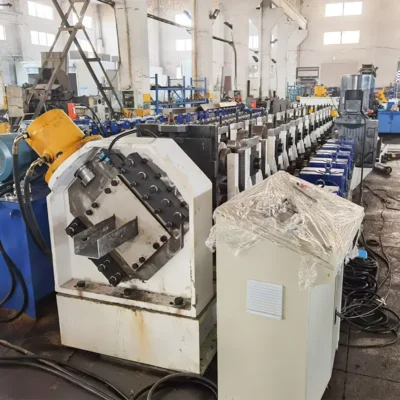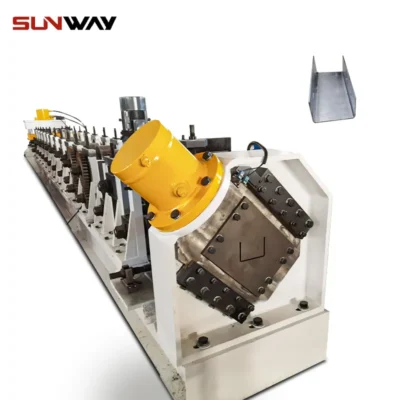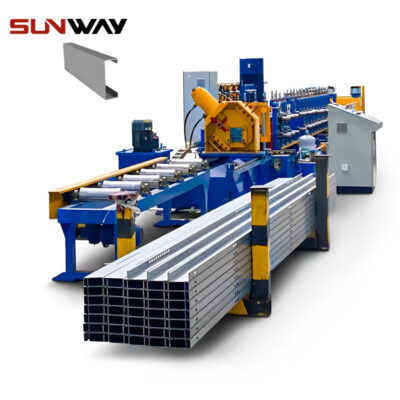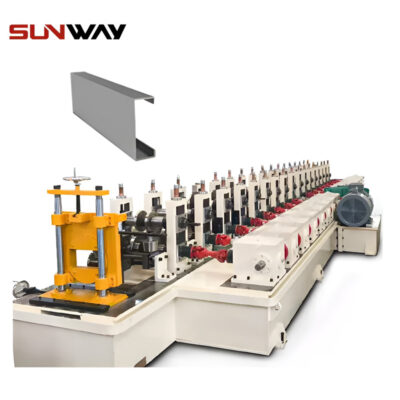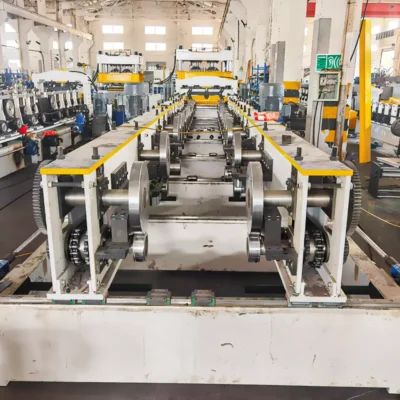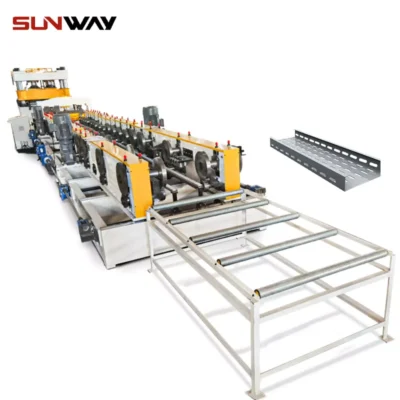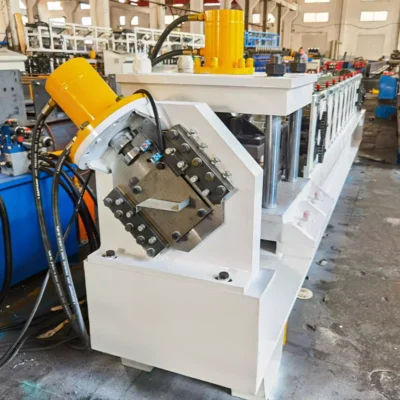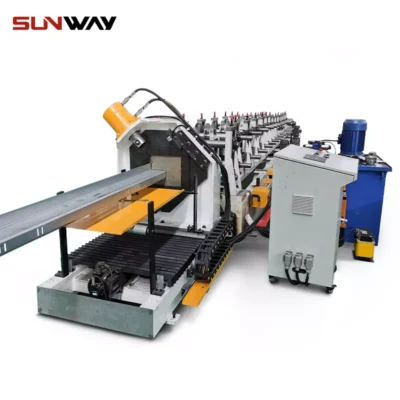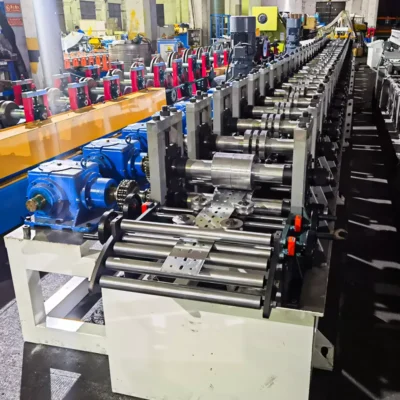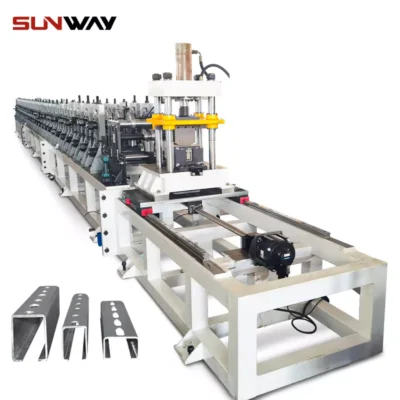Elevator shafts are the backbone of vertical transportation in modern buildings, serving as the supporting structure for elevators in residential, commercial, and industrial spaces. As the construction industry moves toward modularization and pre-fabrication, the demand for precision-engineered elevator shaft components is growing exponentially. This is where the Elevator Shaft Roll Forming Machine comes into play—offering an efficient, scalable, and cost-effective solution for the production of elevator shaft profiles and structural components.
In this comprehensive guide, we’ll explore everything you need to know about Elevator Shaft Roll Forming Machines, including their applications, features, pricing, and why Wuxi Sunway Machinery is a global leader in this space. If you’re in the construction or manufacturing sector, this resource will help you understand how roll-forming technology can revolutionize your operations in 2025.
What is an Elevator Shaft Roll Forming Machine?
An Elevator Shaft Roll Forming Machine is a specialized industrial machine designed to produce the structural profiles and components used in the construction of elevator shafts. These profiles, which include guide rails, brackets, and side walls, are critical for ensuring the stability, safety, and reliability of elevator systems.
The roll-forming process involves feeding metal coils through a series of rollers, which gradually shape the material into precise profiles. This method not only ensures dimensional accuracy but also supports high-volume production, making it ideal for the elevator manufacturing industry.
Applications of Elevator Shaft Roll Forming Machines
The components produced by Elevator Shaft Roll Forming Machines are integral to a wide range of construction and manufacturing projects. Here are the primary applications:
1. High-Rise Residential Buildings
- Use Case: Elevator shafts for skyscrapers and multi-story apartment complexes.
- Why It Matters: Roll-formed profiles ensure the structural integrity and safety of elevators in high-rise buildings.
2. Commercial Towers
- Use Case: Elevator shafts for office buildings, hotels, and retail spaces.
- Why It Matters: Durable and precise profiles meet the high traffic demands of commercial spaces.
3. Industrial Facilities
- Use Case: Heavy-duty elevator shafts for warehouses, factories, and plants.
- Why It Matters: Corrosion-resistant profiles withstand challenging industrial environments.
4. Public Infrastructure
- Use Case: Elevator shafts for airports, railway stations, and public buildings.
- Why It Matters: High-strength profiles meet the safety and load-bearing requirements of public infrastructure projects.
5. Modular Construction
- Use Case: Pre-fabricated elevator shafts for modular and pre-engineered buildings.
- Why It’s Crucial: Roll-forming machines enable the mass production of components, accelerating construction timelines.
6. Retrofitting and Modernization
- Use Case: Upgrading or replacing elevator shafts in existing buildings.
- Why It Matters: Customizable profiles allow for seamless integration into older structures.
Key Features of Wuxi Sunway Elevator Shaft Roll Forming Machines
Wuxi Sunway Machinery is renowned for its advanced roll-forming machines, designed to meet the specific needs of the elevator manufacturing industry. Here’s what sets their Elevator Shaft Roll Forming Machines apart:
1. Multi-Profile Production
- What It Offers: Machines can produce a variety of profiles, including guide rails, brackets, and side panels.
- Why It’s Revolutionary: Supports the production of all essential elevator shaft components in one machine.
2. Material Versatility
- Supported Materials:
- High-strength steel
- Galvanized steel
- Stainless steel
- Aluminum alloys
- Why It Matters: Allows manufacturers to produce profiles that are lightweight, durable, and corrosion-resistant.
3. High Precision and Tolerance
- What It Does: Ensures profiles are produced with tight tolerances and smooth finishes.
- Why It’s Important: Guarantees the structural stability and safety of elevator shafts.
4. Modular Design Capabilities
- What It Offers: Machines can produce profiles with pre-punched holes, slots, and modular connections.
- Why It’s Revolutionary: Simplifies assembly and installation, reducing on-site labor costs.
5. High-Speed Production
- Performance: Machines can produce up to 35 meters of profiles per minute, depending on the design.
- Why It Matters: Meets the high-volume demands of elevator manufacturers.
6. Fully Automated Operations
- Features:
- PLC-controlled systems with a user-friendly interface.
- Real-time monitoring and error detection.
- Automated stacking and packaging systems.
- Why It’s Revolutionary: Reduces the need for skilled labor while ensuring consistent quality.
7. Customizable Tooling Systems
- What It Includes: Interchangeable tooling systems for quick transitions between different profile designs.
- Why It Matters: Enhances flexibility for manufacturers serving multiple markets and applications.
8. Eco-Friendly Operation
- What It Offers: Energy-efficient motors and waste-reducing technologies.
- Why It Matters: Aligns with sustainability goals and reduces operational costs.
Production Workflow of an Elevator Shaft Roll Forming Machine
The production process for elevator shaft components is designed to maximize efficiency and precision. Below is an overview of the workflow:
1. Decoiling
- Raw metal coils are loaded onto the decoiler, which feeds the material into the machine.
2. Leveling
- A leveling system ensures the material is flat and free from warping or defects before entering the roll-forming section.
3. Roll Forming
- The material passes through a series of rollers that gradually shape it into the desired profile, such as a guide rail or side panel.
4. Cutting and Punching
- Integrated cutting units trim profiles to the required lengths, while punching systems create holes or slots for connections.
5. Surface Finishing (Optional)
- Additional treatments, such as powder coating or anti-corrosion finishes, can be applied to enhance durability and aesthetics.
6. Stacking and Packaging
- Finished profiles are automatically stacked and packaged for easy transportation and assembly.
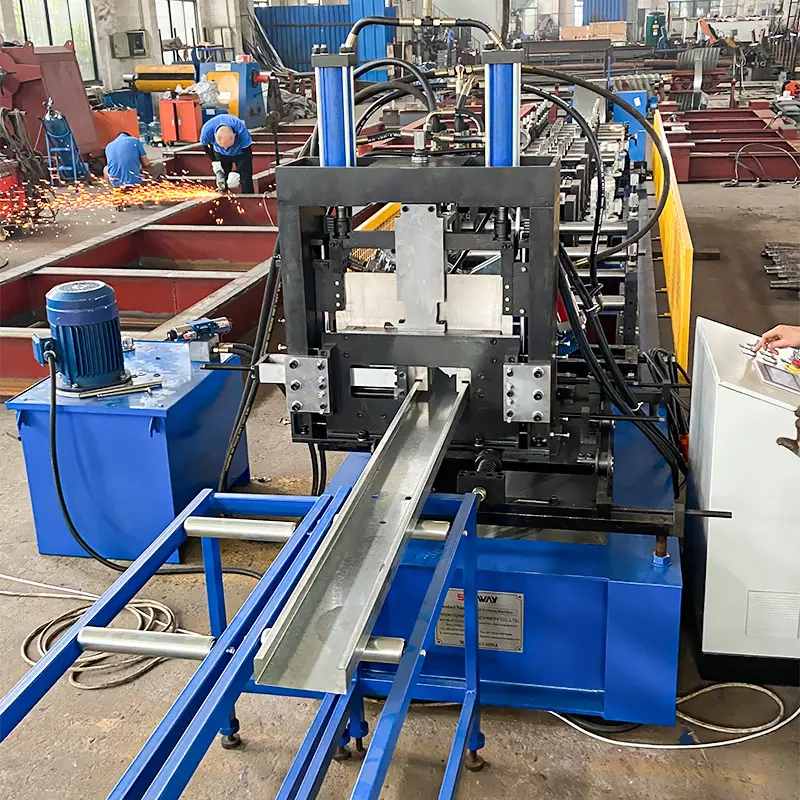
Pricing of Elevator Shaft Roll Forming Machines
The cost of an Elevator Shaft Roll Forming Machine varies depending on its features, production capacity, and customization options. Below is a general pricing guide for 2025:
| Machine Type | Capabilities | Price Range (USD) |
|---|---|---|
| Standard Machines | Basic profile production | $250,000–$450,000 |
| High-Precision Machines | Advanced tolerances and multi-profile output | $450,000–$700,000 |
| Fully Customizable Machines | Multi-material compatibility and custom features | $700,000–$1,000,000 |
For specific pricing and financing options, contact Wuxi Sunway Machinery.
Advantages of Using Elevator Shaft Roll Forming Machines
Investing in an Elevator Shaft Roll Forming Machine offers substantial benefits for manufacturers:
1. Enhanced Efficiency
- High-speed operation reduces lead times and increases output.
2. Precision and Consistency
- Ensures uniform quality across all components, minimizing assembly errors.
3. Material Flexibility
- Supports a wide range of materials, including high-strength and corrosion-resistant alloys.
4. Cost Savings
- Reduces material waste and labor costs, improving overall profitability.
5. Scalability
- Suitable for both small-scale manufacturers and large-scale production lines.
FAQs About Elevator Shaft Roll Forming Machines
| Question | Answer |
|---|---|
| Can the machine produce custom profiles? | Yes, it supports multi-profile capabilities for customized elevator shaft designs. |
| What is the production speed? | Machines can produce up to 35 meters of profiles per minute, depending on the design. |
| Does Sunway provide operator training? | Absolutely! Wuxi Sunway offers comprehensive training for operators and technicians. |
| What is the expected lifespan of the machine? | With proper maintenance, the machine can last 10–15 years or more. |
| Are financing options available? | Yes, flexible financing options are offered to qualified buyers. |
| Does the machine support pre-coated materials? | Yes, it is designed to handle pre-coated and pre-painted materials with precision. |
Global Trends Driving the Demand for Elevator Shaft Roll Forming Machines
The construction and transportation industries are undergoing rapid changes, with elevator shafts playing a pivotal role in modern building design. Below are the key trends influencing the adoption of Elevator Shaft Roll Forming Machines:
1. Urbanization and the Growth of Vertical Cities
- The Trend: By 2050, nearly 70% of the world’s population will live in urban areas. Skyscrapers and high-rise buildings are becoming the norm to accommodate this growth.
- Impact on Elevator Shafts: The demand for taller and more efficient elevator systems is increasing, requiring precise and high-quality shaft components.
- Why It Matters: Roll-forming machines enable scalable and consistent production of elevator shaft profiles to meet the needs of these vertical cities.
2. High-Rise Construction Boom
- The Numbers: The global high-rise building market is projected to grow at a CAGR of 5.2% through 2030.
- Impact on Elevator Shafts: Taller buildings require advanced elevator systems with robust shaft structures to ensure safety and functionality.
- Why It’s Crucial: Roll-forming technology ensures that shaft components are strong, durable, and compliant with international standards.
3. Focus on Safety and Compliance
- The Shift: Governments and regulatory bodies are enforcing stricter safety standards for elevators, especially in high-traffic and high-risk buildings.
- Impact on Elevator Shafts: Manufacturers must produce components that meet fire resistance, load-bearing, and seismic stability requirements.
- Why It’s Important: Roll-forming machines provide the precision needed to produce compliant and safe elevator shaft components.
4. Modular and Pre-Fabricated Construction
- The Opportunity: Modular construction is reshaping how buildings are designed and assembled, with pre-fabricated elevator shafts being a key innovation.
- Impact on Elevator Shafts: Pre-assembled shafts reduce on-site labor and construction time, ensuring faster project completion.
- Why It’s Relevant: Roll-forming machines are central to this trend, enabling the mass production of modular components.
5. Sustainability in Construction
- The Push: The construction industry is under increasing pressure to adopt sustainable practices, with a focus on reducing material waste and carbon emissions.
- Impact on Elevator Shafts: Lightweight and recyclable materials are being prioritized for elevator shaft construction.
- Why It’s Exciting: Roll-forming machines support this by minimizing waste, optimizing material usage, and enabling the use of eco-friendly materials.
6. Retrofitting and Modernization
- The Challenge: Aging infrastructure in developed countries is driving the need for elevator modernization and retrofitting projects.
- Impact on Elevator Shafts: Custom shaft components are needed to integrate modern elevator systems into older buildings.
- Why It’s Important: Roll-forming machines can produce bespoke profiles that fit seamlessly into existing structures.
Technological Advancements in Elevator Shaft Roll Forming Machines
The advancement of Elevator Shaft Roll Forming Machines is being driven by innovations that enhance precision, efficiency, and sustainability. Here are the key technologies reshaping the industry in 2025:
1. Artificial Intelligence for Quality Assurance
- What It Does: AI algorithms monitor the entire production process, identifying defects and optimizing machine settings in real-time.
- Benefits:
- Ensures consistent quality for all profiles.
- Reduces material waste by detecting issues early.
- Enhances overall production efficiency and minimizes downtime.
2. IoT-Enabled Monitoring
- How It Works: Internet of Things (IoT) sensors collect data on machine performance, material usage, and output quality.
- Advantages:
- Facilitates remote monitoring and predictive maintenance.
- Reduces the risk of unplanned downtime.
- Enhances integration into smart manufacturing ecosystems.
3. Advanced Material Compatibility
- The Innovation: Modern machines can handle a wide range of materials, such as stainless steel, galvanized steel, and composite alloys.
- Why It’s Revolutionary:
- Expands the range of applications for elevator shaft profiles.
- Supports the production of lightweight yet durable components.
- Meets the specific demands of different construction projects.
4. Servo-Controlled Precision
- The Technology: Servo motors provide exact control over rollers, cutting systems, and punching units.
- Why It’s Crucial:
- Ensures flawless dimensions and smooth finishes.
- Enhances the structural integrity of elevator shaft components.
- Reduces energy consumption, aligning with sustainability goals.
5. Modular Tooling Systems
- What It Offers: Interchangeable tooling systems enable manufacturers to quickly switch between different profile designs.
- Why It’s Important:
- Simplifies the production of custom elevator shaft components.
- Reduces downtime during tooling changes.
- Enhances flexibility for manufacturers catering to multiple markets.
6. Energy-Efficient Designs
- What It Includes: Energy-efficient motors, regenerative braking systems, and optimized power distribution.
- Why It Matters:
- Reduces electricity consumption and operational costs.
- Aligns with global sustainability initiatives.
- Improves profitability for manufacturers.
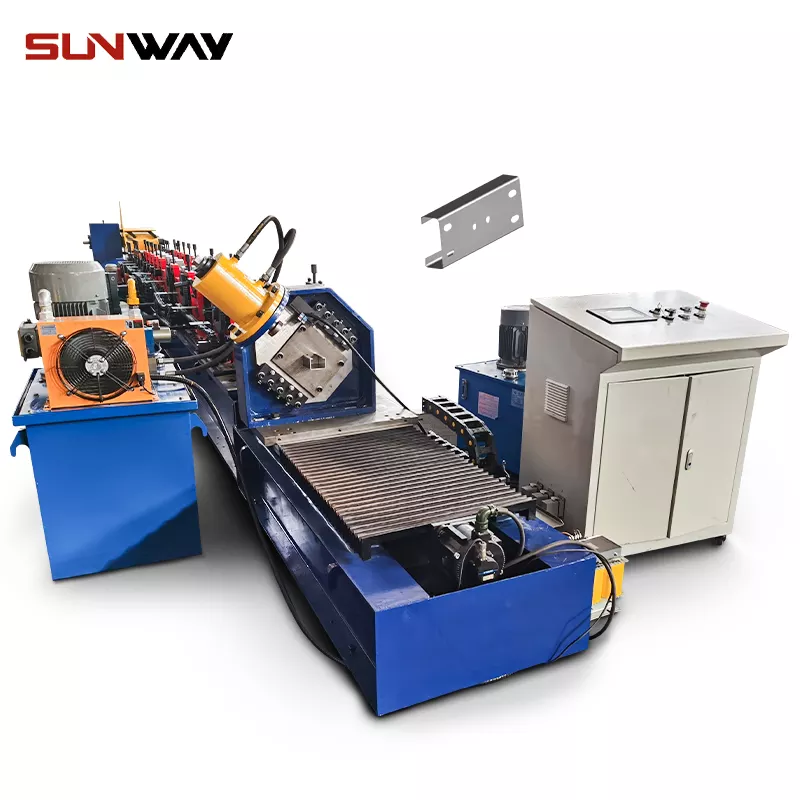
Environmental Impact of Elevator Shaft Roll Forming Machines
As sustainability becomes a critical focus in manufacturing and construction, Elevator Shaft Roll Forming Machines are playing a key role in reducing environmental impact. Here’s how they contribute to eco-friendly practices:
1. Material Optimization
- How It Works: Roll-forming machines shape metal with high precision, minimizing scrap and offcuts.
- Impact:
- Conserves raw materials, reducing environmental impact.
- Lowers production costs for manufacturers.
2. Recyclable Outputs
- What It Supports: Machines can process recyclable materials like aluminum and galvanized steel.
- Why It Matters:
- Promotes a circular economy by enabling material reuse.
- Reduces landfill waste and supports green building practices.
3. Energy Efficiency
- The Innovation: Modern machines are designed to consume less energy while maintaining high production speeds.
- Why It’s Crucial:
- Helps manufacturers reduce their carbon footprint.
- Aligns with global sustainability goals, such as net-zero emissions.
- Improves overall operational efficiency.
4. Localization of Production
- What It Enables: Manufacturers can produce elevator shaft components locally, reducing the need for long-distance transportation.
- Outcome:
- Cuts down on emissions associated with shipping.
- Improves the reliability of supply chains.
Additional FAQs About Elevator Shaft Roll Forming Machines
| Question | Answer |
|---|---|
| What materials can the machine process? | It supports high-strength steel, galvanized steel, aluminum alloys, and stainless steel. |
| What is the lead time for delivery? | Lead times vary based on customization but typically range from 60 to 90 days. |
| Is operator training included? | Yes, Wuxi Sunway provides comprehensive training with every machine purchase. |
| Does the machine support modular tooling? | Absolutely! Interchangeable tooling systems are standard in most models. |
| Are automated stacking systems available? | Yes, integrated stacking and packaging systems can be included for streamlined operations. |
| What maintenance is required? | Routine maintenance includes lubrication, inspection of rollers and tooling, and system calibration. |
Why Choose Wuxi Sunway Machinery for Elevator Shaft Roll Forming Machines?
Wuxi Sunway Machinery is a global leader in roll-forming technology, trusted by manufacturers worldwide. Here’s why they’re the top choice for elevator shaft roll-forming solutions:
- Proven Expertise: Decades of experience in delivering cutting-edge roll-forming machines.
- Customization Excellence: Machines tailored to meet the unique needs of elevator shaft manufacturing.
- Global Reach: Trusted by clients in Asia, Europe, the Americas, and beyond.
- Sustainability Leadership: Eco-friendly designs that minimize waste and reduce energy consumption.
- Advanced Technology: Features like AI-driven quality control, IoT integration, and servo-controlled precision.
- Comprehensive Support: From installation to maintenance, Sunway ensures seamless operations and customer satisfaction.
Conclusion: Redefining Elevator Shaft Manufacturing for the Future
The Elevator Shaft Roll Forming Machine is revolutionizing how elevator shafts are designed and manufactured, enabling precision, scalability, and sustainability. Whether you’re constructing high-rise buildings, modernizing existing infrastructure, or embracing modular construction, these machines offer the efficiency and innovation needed to succeed in 2025 and beyond.
Ready to elevate your manufacturing capabilities? Contact Wuxi Sunway Machinery today to explore their advanced roll-forming solutions. Together, let’s build the future of vertical transportation—one profile at a time!

